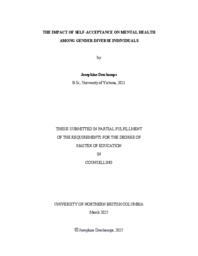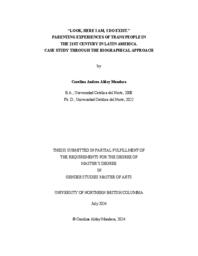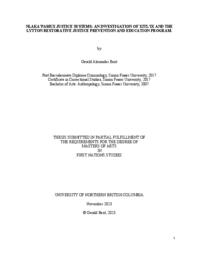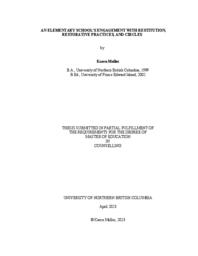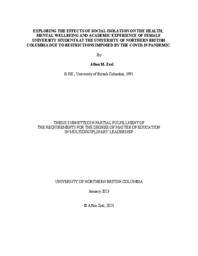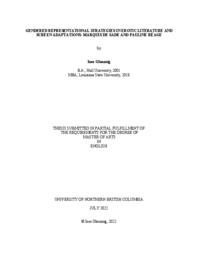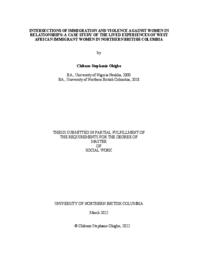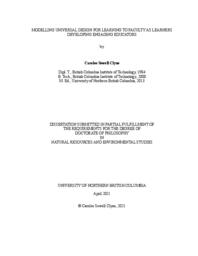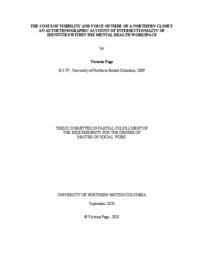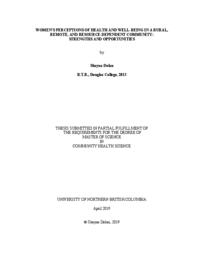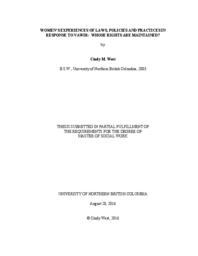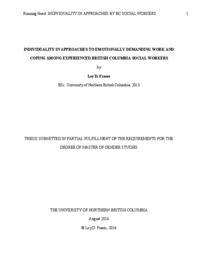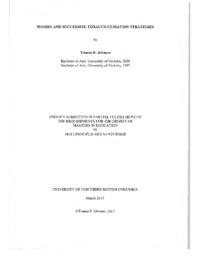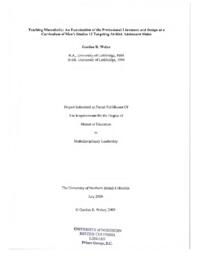Healy, Theresa
Person Preferred Name
Theresa Healy
Related Works
Content type
Digital Document
Origin Information
Content type
Digital Document
Origin Information
Content type
Digital Document
Description / Synopsis
This thesis investigates an Indigenous community’s traditional justice model called Xitl’ix, as well as the Lytton Restorative Justice Prevention and Education Program that is currently being utilized by members of the Lytton Indian Band. This qualitative study uses Indigenous Storywork Methodology and Narrative Inquiry, to explore the participants’ experiences with Xitl’ix and the Lytton Restorative Justice program. Due to the global pandemic, several video conference interviews, which the researcher refers to as virtual sharing circles, were held with eight participants. Six participants are from the Lytton Indian Band, one participant is a non-Status Indian and former director of the Lytton Restorative Justice Prevention and Education Program, and the last participant is a settler person who is a former high school principal. Each participant provided their perspective about Xitl’ix (Nlaka’pamux Court), the Lytton Restorative Justice Prevention and Education Program and/or Restorative Justice programs and services. The themes that emerged from the virtual sharing circles include Nlaka’pamux Knowledge, Indigenous healing, and ultimately provided a stronger foundation of understanding of the Xitl’ix teachings and the Lytton Restorative Justice Prevention and Education Program. During one of the virtual sharing circles and unexpected finding was revealed that described another Nlaka’pamux justice system, which has not been memorialized or described in past research about the Nlaka’pamux people.
Origin Information
Content type
Digital Document
Description / Synopsis
Canadian schools have long employed punitive discipline, a colonial paradigm that is hierarchical and exclusionary. Using Participatory Action Research, two Indigenous and nine non-Indigenous educators collaborated to implement a restorative model into an elementary school in northern British Columbia. Our hybrid of Restitution and Restorative Practices (RRP) and Circles included regional Indigenous protocols. A thematic analysis of participant interviews revealed patterns in the key areas of belonging, cultural safety, trauma informed practice, shame, and decolonizing education. RRP was experienced as an egalitarian model and Indigenous protocols supported community building during Circle practice. Implementation of RRP and Circles (RRP/C) did not represent enough structural change to decolonize discipline, but this hybrid was a relational and holistic model that integrated the Indigenous values of consensus building, interconnection, and harmony. Concerns with the model and its implementation included cultural racism, resistance, vulnerability, shame, and safety.
Origin Information
Content type
Digital Document
Description / Synopsis
Students experience stress and anxiety as they enter university and learn to manage a new environment, experience increased academic pressure, and adjust to a healthy university/life balance. The purpose of this qualitative study was to explore the experiences of female undergraduate students who attended the University of Northern British Columbia during the COVID-19 pandemic. I further seek to highlight the effects of social isolation on female undergraduate health, mental wellbeing, and academic experience. I am referring to the female university participants throughout this paper where the words student and students are presented. The results of the study showed that the participants in the study experienced compounded levels of stress and anxiety by imposing restrictions on social interactions and discovering how to successfully attend university online.
Origin Information
Content type
Digital Document
Description / Synopsis
This thesis explores the relationship between pornography, eroticism, and censorship, focusing on the reception of sexually explicit representations in literature and film by the public and governing bodies in their sociopolitical, cultural, and legal contexts. My comparative analysis of Marquis de Sade’s Justine (1797), its intertextual dialogist, Pauline Réage’s Story of O (1954), and their respective twentieth-century screen adaptations, by Jess Franco and Just Jaeckin, attempts to demonstrate changes in attitudes toward what once was considered to be top-shelf cultural production over time. Drawing on the intersection of cultural, feminist, film, sexuality, and pornography studies, my work examines how, and to what extent, Sade, Réage, Franco, and Jaeckin had their fair share of trouble with censorship laws, and the ways they challenge and subvert the accepted sexual norms and, by extension, then current state body politics by propagating the ideas of sexual freedom, freedom of choice, and sexual equality
Origin Information
Content type
Digital Document
Description / Synopsis
This research is for the researcher’s graduate thesis, as a requirement to obtain a Master of Social Work degree. The thesis research was conducted via distance (using telephone and password-protected audio conferencing) with four immigrant women. Using a case study approach and framed by socialist feminist intersectional theories and transformative framework, this thesis examines the intersections of immigration and violence against women in relationships (VAWIR) on multiple axis including gender, race, class, immigrant, and economic status to better understand factors that shape the experiences of visible minority immigrant women dealing with domestic violence and abuse. The findings of this thesis would contribute to different viewpoints on the experiences of VAWIR among immigrant women and bring more understanding to a variety of ways immigrant women respond to and cope with violence in their relationships as well as shape future policies and practices to more effectively service immigrant women of African descent.
Origin Information
Content type
Digital Document
Description / Synopsis
Canada implemented Bill C-127 to eliminate sexual assault against wives in 1983, while Ghana criminalized marital rape in 2007. Although Ghana was late in establishing the Domestic Violence Act, which eliminated the idea that husbands can rape wives, there has been little to no legal report of marital rape in Ghana. This study explored the experiences and perceptions on the factors that lead to the justification of marital rape among Ghanaian-Canadian women. The study adopted a qualitative research approach and a descriptive case study design. The general research question was: What factors influence the justification of marital rape as perceived and experienced by Ghanaian-Canadian married women? A purposeful sampling procedure targeted Ghanaian-Canadian women living in Canada. A total of twenty (20) highly educated women participants within the ages of 28-63 were identified. A case study was pursued using semi-structured interviews. Telephone interviews were conducted with all the participants. The methods of data analysis of the interview data involved transcription, categorization, and coding for major themes. Major themes identified as factors that influence the justification of marital rape include the following: lack of confidence in the Ghanaian judicial system, exaggerated ideas of the effectiveness and ruthlessness of the Canadian judicial system in dealing with marital rape, economic instability, and women's immigration status. Hence, one major factor that helped achieve these findings was the comparative approach the participants identified by relating the Ghanaian society to their host country, which helped to examine differing influences of the identified themes. Ethical consideration to confidentiality and anonymity are demonstrated in this thesis with pseudonyms used for the participants in the discussion of the findings. The thesis concludes with vital recommendations such as the need for further research to uncover the factors leading to the justification of rape from diverse religious and non-religious groups and tribes of diverse nationalities living in Canada, and further research to investigate the support services available within Canada’s provinces and their response to domestic violence, especially with women of colour.
Origin Information
Content type
Digital Document
Description / Synopsis
The question explored through this research study is: Does modelling Universal Design for Learning to university faculty as learners deepen their engagement as educators? Through providing training where faculty themselves are learning about Universal Design for Learning (UDL) through a UDL modelled environment (CAST, 2018b; Meyer, Rose, & Gordon, 2014), this research project investigates if this experience translates into a stronger role as educators for these faculty. Participants in this research project are faculty members teaching in disciplines associated with Natural Resources and Environmental Studies. Through a virtual World Café, participants of the workshop shared their reflections and experiences as they learned about learning. Using the UDL framework’s horizontal organization, as conceptualized by CAST, as a lens, participant reflections were themed to determine their progression towards learning and understanding the UDL framework in this context. Evaluation of this research data indicated that faculty in this study are located along UDL Access and Build rows of the UDL Guidelines reflecting a novice learning stage where greater cognitive energy is required (Posey, 2019a, 2019b). This knowledge provides evidence that professional development opportunities should support strategies and provide the guidance necessary to foster their skills towards the UDL goal of becoming an expert learner. Elevating faculty to the UDL expert teacher level in this context enhances their skills and understanding in their creation of inclusive learning environments for their classrooms (Meyer, Rose, & Gordon, 2014).
Origin Information
Content type
Digital Document
Description / Synopsis
This research explores the experiences of women participating in CDOs (community development organizations) in communities in northern British Columbia and how that participation affects their capabilities. Data was gathered through interviews, electronic surveys, and participant observation. This data was then assessed within the combined theoretical frameworks of the capabilities approach and participatory development. Through analysis, the positive impacts of women’s participation in CDOs on their capabilities and communities were brought to light.
Origin Information
Content type
Digital Document
Description / Synopsis
This study is an exploration of the intersectionality of my two identities, lesbian and social worker, within the northern British Columbia (BC) mental health workspace. By taking a transformative stance and making use of queer methodology, I present my voice as both the researcher and the researched. My data sources are based on past recollections and a collection of personal poems, reflections, stories, journal entries, sketches, collages, and photographs. Through autoethnographic accounts, I examine experiences as my identities intersect and become the focus of workplace bullying and harassment within the setting of northern British Columbia (BC) mental health system. I also examine the personal and professional costs of using internal agency and provincially legislated protocols and policies in challenging workplace bullying and harassment behaviour, such as the little-known topic of disenfranchised grief.
Origin Information
Content type
Digital Document
Description / Synopsis
This research sought to explore the perceptions of health and well-being for women in a rural and remote northeastern British Columbia community experiencing intense social, ecological, and economic change as a result of its dependence on natural resource extraction. Designed as a qualitative inquiry into the health of local women, this research is informed by social constructivism, feminist theory, and ecosystems approaches to health. Engagement with participants and data collection was heavily influenced by Appreciative Inquiry, a strengths-based approach that identifies assets within a given system with the aim of contributing to positive change. Findings indicate that equitable access, perceptions of people and place, and leadership, communication, and collaboration are factors that strongly impact women’s health and in this context.
Origin Information
Content type
Digital Document
Origin Information
Content type
Digital Document
Origin Information
Content type
Digital Document
Origin Information
Content type
Digital Document
Origin Information

